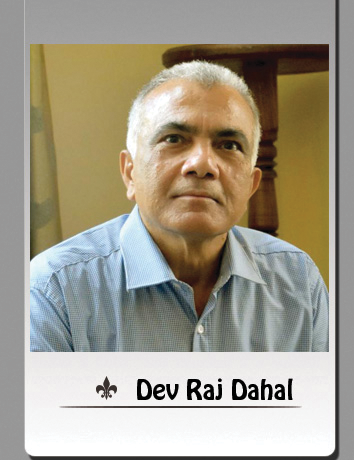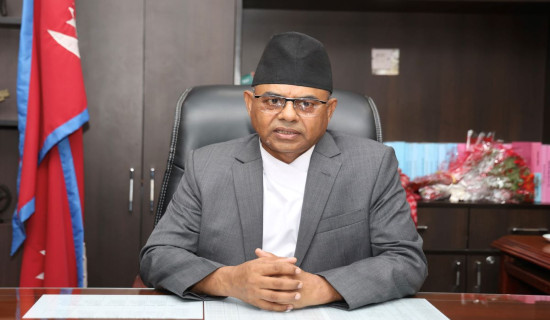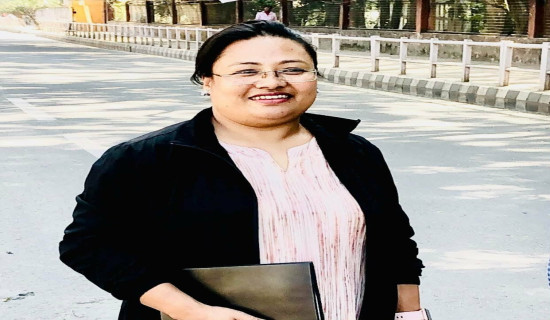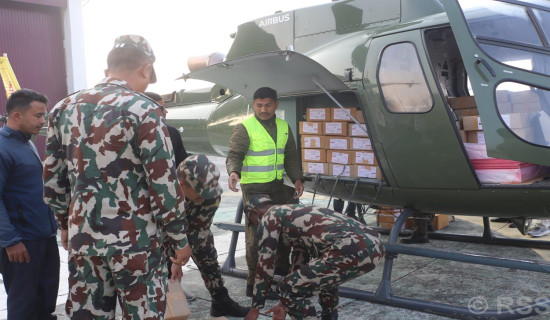- Thursday, 26 February 2026
Political Efficacy Key To Functional Democracy
Dev Raj
Dahal
Political efficacy of people is a vital and attractive feature of functional democracy. The concept signifies that people experience certain confidence in their capacity and will to keenly participate in the political process and control its decisional outcome. The enthusiasm of Nepalis to act willfully in political activities is thus deemed their political efficacy. Application of imagination, intelligence and creativity are vital elements to make their voice count – well heard and heeded to in public life. This prepares a better generation for governance. Political efficacy creeps around the edge of full consciousness. It enables them to learn the craft of politics and exercise experience about democratic principles and constitution to settle myriad issues affecting them.
It is a sign of political maturity where Nepalis value a sentiment that they have the flair to bring desirable and participatory ecological, social, economic and political change to uplift loftier spirits of freedom and wellbeing and also cultured to become considerate to those in grief. In Nepal, political efficacy demands a wide-ranging and critical political education of people about the art and science of democratic governance. It is vital to attain their collective goal and create an environment necessary for mutual adapting, respecting and cooperating to evolve a national political culture, not moving back from social duty. This entails the alignment of political life of Nepalis to civic ideals, morality and constitutional culture to unshackle self from a callously apathetic and expedient person.
Accountability The slumbering passion of leaders cannot flutter Nepali people to their self-confidence and dignity if the process of political communication and acculturation remains ephemeral. This means political efficacy in Nepal can be equated with a free spirit, maturity and self-perfecting virtues of people, filled with generative energy to leap forward to progress, stability and peace. It loathes the glorification of cruelty which dithers Nepalis desire to acquire full citizenship and humanity.
Nepali leaders or those in authority can use political power with accountability if a sense of political efficacy in the people remains hale and hearty and their awakening to their rights and duties can sensibly empower them to exercise their sovereign power. This helps to bust “false consciousness,” “consent manufacturing,” “political indoctrination,” knowledge hegemony or corporatist domination which no sane Nepali deems democratic befitting their primacy - the basis of power and legitimacy.
One key element of political efficacy is that people can shape the course of political development, laws and public policies on the basis of constitution, public opinion, consultation and deliberation without the domination of leaders, experts and powerful elites of society, even special interest groups that bend the political process unhelpful for their blissful life. Systematic reforms of the flawed constitution of individuals and political structures, in this sense, are a step to stimulate the political efficacy of Nepalis and restore the rationale, sincerity and integrity of democratic politics.
The significance of political efficacy in Nepal is, therefore, tall in political analysis yet least debated in the public sphere, political platform, party schools and intellectual circles. Self-awareness of Nepalis, confidence in self to influence power and institutions and active engagement and representation in decisions enhance their civic competence.
The more the Nepalis build their aptitude to exercise constitutional and human rights and feel efficacious the greater the level of their active and voluntary participation in public activities. Rights-oriented reasoning, communication and political education can widen political efficacy across even pre-existing social boundaries, illuminate the function of polity and satisfy the sense of poise thus motivating people to act as energetic agents of progressive social change. It can shape social solidarity and civic culture of the nation. One can find success in the public action of various federations and social movements in Nepal in attaining their policy objectives.
By contrast, group-enclosed collective bargaining for special interests cannot help much to build the efficacy of Nepal’s predominantly informal sectors of society, economy and politics and boost their political competence in goal attainment. Obviously, passive, estranged and uninterested people do not rear democracy as they do not have any stake in its survival, deepening and consolidation. They only register invalid voting or deliver no vote. In old politics, leaders are free from voters’ concern once elected. Spoiled by the deluxe life of cities they conceal in the deceptive label of fractured parties without rhyming to meet electorates’ needs. But in modern politics, they require constant political contact, communication and feedback from people to ward off a wild boil. Such unconcern to their needs can thus make voters de-align, detach and shift partisan loyalties. Nepal’s recent elections have amply shown efficacy deficits.
Political efficacy in Nepal requires civic virtues whereby people and leaders put public interests above themselves in political action. It is because exclusive self-interests are too diverse and layered relative to their conditions and animus to collective public action. The vision of self-governance springs from active, rational and enlightened people inspired by a spur to nation-building and public good. Robert D. Putnam defines three civic virtues vital for functional democracy: active participation in public life, trustworthiness, and reciprocity that is acquired through social connectedness. These virtues are critical in building the collective capacity of Nepalis to nurture the voice of the nation and engage in cooperative action.
The constitutional doctrine of Nepal too underlines that popular sovereignty embodies the will of the nation. It is their natural rights too and amounts to a moral duty to a society over individual persona. The notion of human rights has further legitimised this and brought Nepalis in the gaze of the global public. The centralisation of Nepali political parties has, however, ignited the plurality of sensation of people thus warning the leaders of downward spiral of the indicators of progress together with social inclusion, proportional representation and democratic needs. Active citizenship musters efficacy and helps direct the course of society, political parties, civil society and public authorities to assume their tasks where no one can infringe upon the other’s boundaries and finds easy access to and influence over the institutional resources.
This, however, requires fair channels of socialisation to enable Nepalis to comply with legitimate authority, regulate their lives and project positive spectacle of trustful politics. The motivating factor of people to engage in politics is their expectations and interest to fulfil their due roles, not just in election and recurrent outburst of agitations but in every aspect of public and private life attached to democracy. Their persistent patterns of interactions among themselves and with leaders and institutions enable them to learn about the purpose and function of polity, build commitment and concert large scale social mobilisation and productive collaboration for the benefits of society and the nation as a whole which is now in the shadow by undue partisan instinct.
Political efficacy reflexively dims if Nepali leaders imposes fatal and polarised cast of subsidiary identity politics of “we” and “they,” erodes the competence of moderate forces to integrate people and polity in the national identity of citizenship, disables them to exercise their conscience and weakens institutional safeguards of their freedom. It is a value-laden concept and thus allows people to judge the performance of their leaders according to constitutional and democratic criteria. The zone of impunity for crime, corruption, rent-seeking, cronyism and adventurism in collusive politics are, however, only the template of power struggle to retain feudal prerogative against the virtuous hope of Nepali people for justice.
Civic knowledge Only civic knowledge, detached from traditional intellectual aristocracy of snobbishness, helps expose knowledge barriers to participation of people and enable to bridge deeper layers of hierarchical reality through fellow feeling of equal citizenship. Knowledge is intimately connected with the context and political interest. Without shared values and interests, it is difficult to create a just public order for their efficacious, orderly and institutional participation in multilevel governance.
Nepali people’s position in various layers of power hierarchy and their differentiated cognition, orientations, beliefs and conduct are the factors that outline their choice. It is their efficacy that enables them to shape politics in society and reform every aspect of life so that they are freed from the burden of dependency. Only then political efficacy can catch the rationality of politics beyond the wild growth of political sects, business, family and interest groups affirmed by general ethics of choice outside the domain of command, control, direction and subordination to powerful leaders.
When Nepalis become efficacious they can free politics from exclusion, alienation, exploitation and deception. The declaration of the constitutional welfare state presumes Nepalis have the right to pursue their own life-project of wellbeing. In this context, political efficacy can remove the gap between the normative frame of constitution and empirical condition of life and enable them to determine their fate by themselves with the aid of conscious cognition and act.
(Former Reader at the Department of Political Science, TU, Dahal writes on political and social issues.)
















